#germanic languages
Photo

Every country that borders the North Sea speaks a Germanic language, except France.
139 notes
·
View notes
Text

Sun, the word for the blinding nuclear fusion reactor in the sky, stems from the same Proto-Indo-European word as French soleil, Swedish sol, Welsh haul, Irish súil, and Ancient Greek hēlios, whence the prefix helio-. They grew apart by the ravages of time. Here's how.
#historical linguistics#linguistics#language#etymology#lingblr#sanskrit#celtic languages#romance languages#germanic languages#ancient greek
323 notes
·
View notes
Text
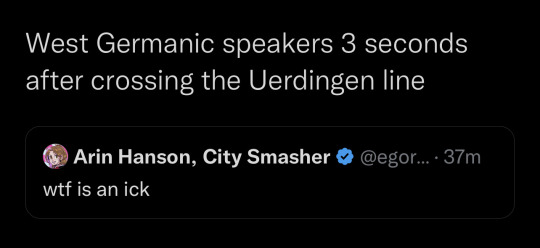
happy year here’s my first unnecessarily niche joke of 2023
#linguistics#language#germanic#germanic languages#uerdingen line#isogloss#langblr#language blog#languageblr#language meme#language memes#linguistics humor#language learning#linguistics memes#linguistics blog#lingblr#studyblr#language lover#lingblog#linguistics tumblr#languages#linguistics jokes#twitter#arin hanson#tweet
950 notes
·
View notes
Text
Dutch and Afrikaans are objectively funny languages to English speakers but English is an objectively funny language to speakers of like every other Germanic language so it balances out.
#Dutch#Afrikaans#English#linguistics#linguistic#languages#linguist shitpost#shitpost#lingblr#germanic languages
73 notes
·
View notes
Text
A comparison of some basic vocabulary in Germanic languages 💙
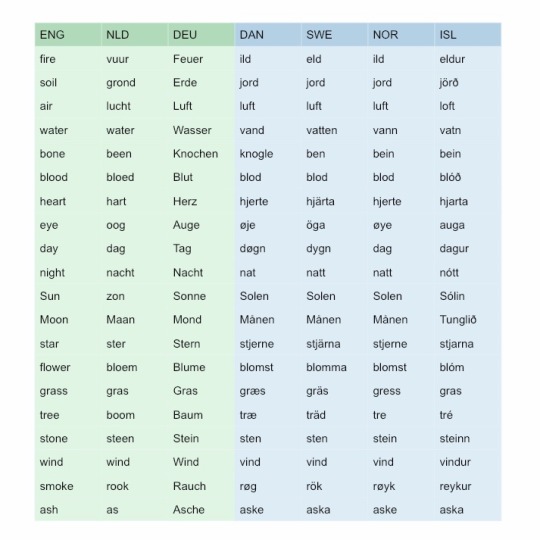
(left to right: English, Dutch, German, Danish, Swedish, Norwegian, Icelandic. West Germanic in green, North Germanic in blue.)
#language#linguistics#vocabulary#germanic languages#english#dutch#german#danish#swedish#norwegian#icelandic#fun facts#random facts#special interest
702 notes
·
View notes
Text

brothers
37 notes
·
View notes
Photo
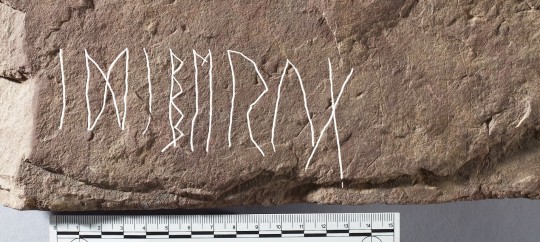
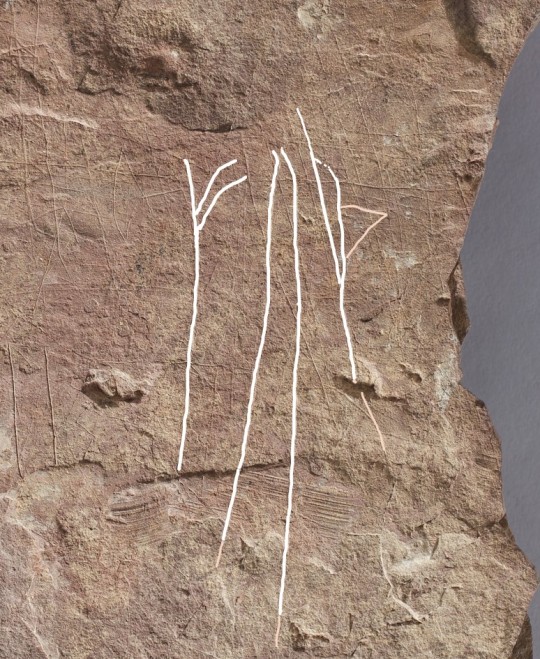
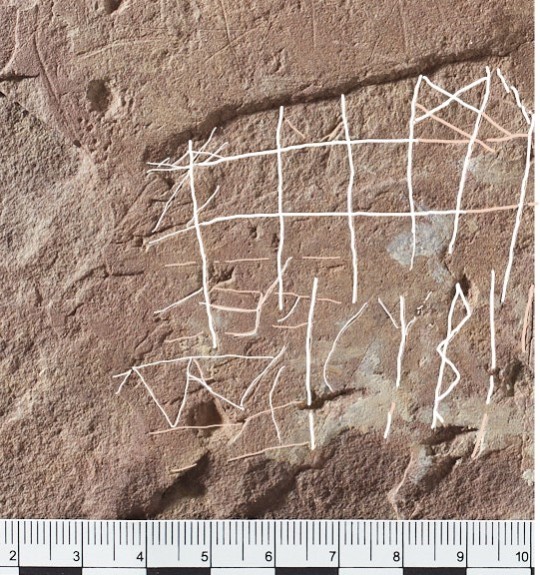
This newly found 2000 year old runestone with runes of the elder futhark was found at Hole, Ringerike, Norway. It was found inside a cremation pit, beneath a barrow, next to three other barrows. Accompanying bone fragments came from a male.
There are several inscriptions; besides runes, also a grid and indecipherable symbols. The most prominent runes spell out a name; 'idiberug' (The final rune could be a reversed 'n', but more likely a 'g'.). This could be Idibera, Idibergu or Idiberga. If it is a woman's name, maybe the wife of the deceased?
There are also three runes on the right side that spell the first runes of the fuþark; f, u and þ - like ABC.
This is a revolutionary find that sets back the date of the earliest runic usage in Scandinavia. Expect a lot more info on this in future
213 notes
·
View notes
Text
The mer prefix in mermaid comes from the Old English mere meaning lake or small body of water, which shares the same Proto-Indo-European root as the Latin mare meaning sea, which gives us maritime and marine.
The word Earth comes from the Old English eorþe which means dirt, ground, dry land, the surface upon which we walk (compare to modern Germanic languages; Danish jorden, Dutch aarde, German Erde, Icelandic jörð, Norwegian and Swedish jord)
It's entirely possible that mermaids would refer to surface dwellers as something along the lines of yormaids, ertmaids, or ardmaids, assuming they spoke human languages which underwent identical linguistic shifts.
Ardfolk, ardpeople, ardmaids, ardmen, they who walk upon the land above
#mermaid#mermaids#merfolk#merpeople#mer#etymology#old english#germanic languages#earth#dry land#surface dwellers#landlubber
393 notes
·
View notes
Text
dutch is just speaking german with an irish accent
#@ the netherlands#fight back!!!#langblr#languages#foreign languages#germanic languages#dutch#netherlands#german#nederlands#polyglot
46 notes
·
View notes
Note
Do you have any tips for studying German at university?
Top 3, in retrospect, as a German teacher now:
• Read through the edits your profs make on your assignments regarding grammar corrections, then complete self-study exercises on them until those types of mistakes steadily disappear to be replaced by those at a higher level of expression. Then do exercises on the mistakes that take their place.
• Ignore people who try to shield you from your studies because the source is "not good German". The same people who told you not to read Bild, listen to rap music, or waste your time on Goethe as a non-native speaker will ask you later on how you know so much about German culture and societal issues, where you've learnt German slang, and how you've learnt the language to an advanced level.
• Read about the development of literary epochs and their features before you cover them in class. Also, don't limit yourself to only those readings on the syllabus.
#germanic languages#polyglot things#german#germanistik#answered anon#asks#studying german at university#langblr#studyblr
30 notes
·
View notes
Photo

Germanic Languages in Europe.
by atlas_cartography
181 notes
·
View notes
Text

To see is not only etymologically related to sight but also to to sue, suite, suit, second, and sequence. All of these words derive from the Proto-Indo-European root *sekʷ-. Its meaning was 'to follow', which in Proto-Germanic shifted to 'to follow with the eyes', hence 'to see'. Here's more.
#proto-indo-european#proto-germanic#english#latin#romance languages#germanic languages#old norse#french#old french#proto-romance#lingblr#etymology#historical linguistics
114 notes
·
View notes
Text
I often hear English speakers proclaim in exasperation that [Insert slightly less screwed up Germanic language here] has such long, awkwardly specific words but they fail to understand that most of these are created on the spot to satisfy a specific context, and because of how the language works they remain understandable despite maybe having never been uttered before.
Recently, a Polish friend of mine found out about the longest word in my language (Afrikaans), being:
"Tweedehandsemotorverkoopsmannevakbondstakingsvergaderingsameroeperstoespraakskrywerspersverklaringuitreikingsmediakonferensieaankondiging" (Yes this is an actual word), which means "issuable media conference’s announcement at a press release regarding the convener’s speech at a secondhand car dealership union’s strike meeting"
Let's do a step-by-step with my language, Afrikaans, slowly adding meaning to create a completely new word as an example.
Wys (Show/to show)
Verwys (literally 'To show toward', this would translate to 'Reference' as a verb in English)
Verwysing (Reference as a noun)
Cool, now we have a word made from scratch, let's add a little more complexity.
Verwysing + Indeks (Index) is Verwysingsindeks (An index of references)
Alright, now let's make another one.
Prys (Prize)
Digter (Poet) + Prys is Digtersprys (The poet's prize)
Digtersprys + wenner (Winner) is Digterspryswenner (Winner of the poet's prize)
One more time:
Onder (under, or in a more archaic form 'among')
Onder + houd(An archaic word for 'hold/to hold) is Onderhoud (An interview. Literally 'held among [people]'
Pers (Press, as in the news people) + Onderhoud is Personderhoud (Press interview)
Personderhoud + e (Plural suffix. This gets slightly complicated so I won't elaborate on why 'e' is used instead of 's' here despite both being plural suffixes) is Personderhoude
Now let's get a little bit mad, shall we? Let's put all these together.
Digterspryswennerspersonderhoudeverwysingsindeks
This singular word that won't exist or be used in any other context means "Index of references to the press interviews of poetry prize winners".
The general rule is "One concept, one word", and although the rules behind how to do this get a little complex at times, especially if you're still learning, but there's no rule in any Germanic language (as far as I'm aware, at least) saying that you can't pull an English and just say it as a sentence instead.
The beauty of Germanic languages (excluding the three wombats in a trenchcoat that is English) is that even with a toddler's knowledge of what's going on, words describe themselves to such an extent that you can get the meaning of fairly high-end concepts just from hearing the word.
Of course, this an extreme example. In most cases you won't have more than two or three or at most four words strung together, but the point stands.
This has been your ADHD driven linguistics lesson for the day.
Edit: Forgot to translate the first long word. Oops
8 notes
·
View notes
Text

World Map 500CE
The Great Migration Project (TGMP)
My linguistic project may have turned into a full-blown worldbuilding project that I am collaborating with my dear friend Aurora. She and I have decided to make two changes to the world.
Firstly, the Germanic tribe in southern Finland has mixed with the finnish culture, leading to a Finno-Germanic culture in the area (creating the Sweans)
Secondly, Aurora has created a Judeo-Slavic culture in Crimea (Yán-Máyim) to tell her aspect of the story of the Jewish during the diaspora (She's Jewish, btw, so pls do not murder us... wait, this is Tumblr, not TikTok/Reddit :D)
I'll share more as we continue to work on the project :)
#linguistics#conlang#historical linguistics#worldbuilding#conlanging#langblr#alternative#alternate history#finnish#proto germanic#germanic#germanic languages#jewish#slavic
15 notes
·
View notes
Text
today on things that make me go "???? :)???? what the fuck :)????"
Linguists: okay, days of the week what are we thinking?
Almost every Germanic language: Tyr's day, Odin's day, Thor's day, and Frigg's day :)
German: yes to all of those, except for odin's day, we call it
Mittwoch (midweek) :)
Icelandic: oh! we like the midweek thing, we'll do that too :)
Linguists: but besides that you'll stick with everyone else too right?
Icelandic:
Lingustis: ... right?
Icelandic: Thirdday, Fifthday, Fasting-day :)
11 notes
·
View notes
